The Armenia Weekly
Gunaysu: Turkish Perception of the Recent US Court Ruling
By Ayse Gunaysu • on August 27, 2009 •
Among thousands of news items showering down from international agencies,
none of the Turkish dailies or TV channels skipped the news about a U.S. Federal
Court of Appeals ruling against Armenian demands for unpaid insurance claims.
Many headlines revealed a hardly concealed note of victory, reporting that the U.S.
Court had dealt a “big blow” to Armenians. Some of them were a little bit more
professional, reflecting only a satisfaction: “Court decision to anger Armenians.
” Even the most seemingly “objective” ones used wording that presented the issue
as a defeat on the part of the “Armenians” —not a violation of the rights of legitimate
beneficiaries, the clients of insurance companies that profited from a government’s
extermination of its own citizens. Even the daily Taraf, considered to be waging the
most courageous struggle against the “deep state,” used the headline: “Bad news
to Armenians from a US court” (Aug. 22, 2009, p.3), a headline that, intentionally
or not, reinforces the essentialist conception of Armenians widespread in Turkey
and reflects a cold-hearted pseudo-impartiality —“bad news”!—in the face of an
infuriating usurpation of one’s rights.
Apart from a handful of people, no one in Turkey, watching the news or reading the
headlines (often without reading the full texts), knows that at the turn of the century
several thousands of Armenians in the provinces of the old Armenia were issued
life-insurance policies, with benefits amounting to more than $20 million in 1915
—dollars still unpaid to the legal heirs of the victims who perished under a reign
of terror. This is not surprising because this audience is even ignorant of the fact
that on the eve of World War I, there were 2,925 Armenian settlements in the old
Armenia, with 1,996 schools teaching over 173,000 male and female students,
and 2,538 churches and monasteries—all proof of a vibrant Armenian presence in
the Ottoman Empire. When I tried to explain this to my 83-year-old mother, who
thought the U.S. court had done something good for Turkey, she couldn’t believe
her ears. She was quite sincere when she asked: “Western insurance companies?
At that time? In Harput, in Merzifon, in Kayseri? Are you sure?” Because she could
not even imagine that what is now to us the remote, less-developed cities with rural
environs where pre-capitalist patterns still prevail—places more or less isolated
from today’s metropolitan centers—were once, before 1915, rich and developed
urban centers, with inhabitants much closer to the Western world than their fellow
Muslim citizens, in their economic activities, social structure, and way of life.
Although a university graduate (something unusual for a woman in Turkey at that
time), a person of culture with a real sense of justice in everything she does, my
mother was brought up in a system of education based on a history that was
rewritten to reconstruct a national identity of pride, and which turned facts upside
down. This was the result: an “enlightened” individual who knew nothing about how
things were in her own—beloved—country and what had happened just a decade
before her birth.
So, how can one expect my mother to know that Talat Pasha, a member of the
PUC triumvira and one of the top organizers of the Armenian Genocide, had
shocked Henry Morgenthau, the U.S. Ambassador to Istanbul in 1915, with his
audacity when he said: “I wish, that you would get the American life insurance
companies to send us a complete list of their Armenian policy holders. They
are practically all dead now and have left no heirs to collect the money. It of course
all escheats to the state. The government is the beneficiary now. Will you do so?”
The Turkish audience, apart from that handful of people, that received the message
about the U.S. Court of Appeals ruling against the Armenians’ right to seek justice,
didn’t stop to think that this was something about one’s most basic rights.
But the reason is simple: National ideology blocks people’s minds. There is a
special meaning attributed to the word “compensation” in Turkey. It is believed that
recognition will be followed by demands of compensation, which will naturally lead
to demands of territory. So, the reference to “compensation” (to be paid to
“Armenians”) in these reports is directly connected in their minds to Armenians’
claim to territory.
This is all about denial. Denial is not an isolated phenomenon, not a policy
independent of all other aspects. Denial is a system. An integrated whole. You
don’t only deny what really happened; in order to deny what really happened, you
have to deny even the existence of the people to whom it happened. In order to
deny their existence, you have to wipe out the evidence of their existence from
both the physical and intellectual environment. Physical refers to the 2,925
Armenian settlements with 1,996 schools and 2,538 churches and monasteries
that are non-existent now. Intellectual corresponds to my mother’s perception
of the U.S. Court of Appeal’s ruling as something good for Turkey.
I watched a film on TV tonight, Akira Kurosawa’s “Rhapsody in August,” a film
about an old lady, a hibakusha (the Japanese word for the victims of the atomic
bombing of Hiroshima and Nagasaki during World War II) and her four grandchildren.
Watching the film, I saw people commemorating their dead ones with great respect,
taking care of their monuments with endless love, raising their children in the same
spirit, observing Buddhist rituals, praying for their losses. The details showing all
these were elegantly and very impressively depicted. Watching a blind hibakusha
gently cleaning the marble platform of the monument with great care, I thought of
Armenians of my country, who are deprived of this very basic right to publicly honor
the memory of their lost ones. This ban is woven into the very structure of Turkish
society, because the founders of the new Turkish Republic and their successors
built a nation and successfully put into practice an “engineering of the spirit”
whereby the people are convinced, made to sincerely believe, that such
commemorations are a direct insult to themselves.
The outcome of such engineering, this whole complicated system of denial, is
very difficult to dismantle. The Turkish ruling elite will not recognize the genocide,
not in the short-term, not in the mid-term. In the long-term, maybe. But how “long”
a term this will be is something unknown. The dynamic that would step up the
process is the recognition from below, i.e. recognition by the people—a very slow
process, but much more promising than an official recognition in the foreseeable
future. People in Turkey are one by one going through a very special kind of
enlightenment—meeting with facts, learning more about the near history,
getting into closer contact with Armenians here and elsewhere (for example,
meeting and listening to Prof. Marc Nichanian speaking in the language of
philosophy and literature, hearing his words about how meaningless an apology
is when what happened to Armenians was “unforgivable,” about the meaning of
the “usurpation of mourning” and the “impossibility of representation” of what
Armenians experienced. More and more stories are appearing in the dailies and
periodicals in Turkey of our grandmothers and grandfathers of Armenian origin
who were stripped of their Armenian identities, at least in the public sphere.
More and more books are being published about the genocide, enabling the
readers to try and imagine what is unimaginable.
This will turn the wheels of a long process of recognition from below, a recognition
in the hearts of people that will inevitably interact with the process of official
recognition—a must for true justice—no matter how distant it may be for the time
being.
ANCA CALLS ON PRESIDENT OBAMA TO REJECT MISGUIDED FEDERAL
APPEALS COURT DECISION
ARMENPRESS:
August 26, 2009
Yerevan
Armenian National Committee of America (ANCA) called on President
Barack Obama to reject a misguided federal appeals court decision
striking down a California law to allow for the return of Armenian
Genocide-era assets, and encouraged him to immediately and publicly
affirm that it is not the "express federal policy" of the United
States, as the court argued, to prohibit the recognition of this
crime by the Congress or the states.
Representative of the ANCA Elizabeth Chouljyan told Armenpress that
the letter follows a August 20th ruling of a three judge panel of the
U.S. Court of Appeals for the Ninth Circuit in the case of Movsesian
v. Versicherung A.G. (No. 07-56722), that struck down a California
law providing remedies for Armenian Genocide-era wrongs. The ruling
contended that state level recognition of this crime contradicts
"express federal policy" and is therefore unconstitutional.
"You bear direct responsibility, Mr. President, by virtue of your
failure to keep your repeated, crystal clear pledges to recognize the
Armenian Genocide, for the Court's judgment that it is the official
policy of the Executive Branch of the United States government to
actively oppose proper recognition of this crime and, upon this basis,
to thus prohibit states from passing laws to help Armenian Genocide-era
victims seek to reclaim lost or stolen property," said Hachikian in
an August 25th letter to President Obama.
The California Legislature passed a law in 2000 giving heirs of those
who died or fled to avoid Armenian Genocide-era persecution until the
end of 2010 to file claims for old bank accounts and life insurance
policies. Class-action lawsuits brought by Armenian descendants in
California and other states led to a $20 million settlement with New
York Life Insurance Co. in 2005 and a $17 million settlement the same
year with French life insurer AXA.
~~~~~~~~~~~~~~~~~~~~~~~~~~~~~~~~~~~~~~~~~~~~~~~~~~~~~~~~~~~~~~~~~~~~~~~~~~~~~~~~~~~~~



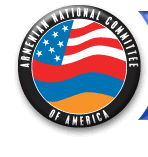



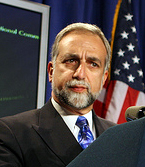
 WASHINGTON, DC – Armenian National Committee of America (ANCA) Chairman Ken Hachikian today called on President Barack Obama to reject a misguided federal appeals court decision striking down a California law to allow for the return of Armenian Genocide-era assets, and encouraged him to immediately and publicly affirm that it is not the “express federal policy” of the United States, as the court argued, to prohibit the recognition of this crime by the Congress or the states.
WASHINGTON, DC – Armenian National Committee of America (ANCA) Chairman Ken Hachikian today called on President Barack Obama to reject a misguided federal appeals court decision striking down a California law to allow for the return of Armenian Genocide-era assets, and encouraged him to immediately and publicly affirm that it is not the “express federal policy” of the United States, as the court argued, to prohibit the recognition of this crime by the Congress or the states. 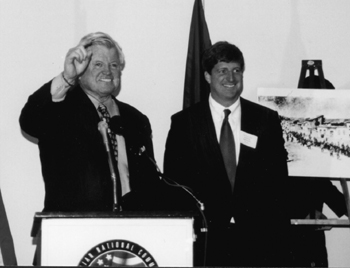 WATERTOWN, MA – The Armenian National Committee of Massachusetts joined with citizens of the Commonwealth and Armenian Americans across the U.S. in mourning the passing of Senate icon and lifelong advocate of Armenian issues, Senator Ted Kennedy.
WATERTOWN, MA – The Armenian National Committee of Massachusetts joined with citizens of the Commonwealth and Armenian Americans across the U.S. in mourning the passing of Senate icon and lifelong advocate of Armenian issues, Senator Ted Kennedy. 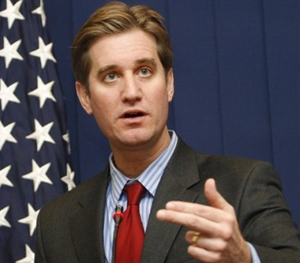 Chairman Ken Hachikian Outlines Envoy's Failings; Challenges State Department Pressure on Armenia to Accept Flawed Madrid Principles; Calls on Secretary Clinton to Stop the Outsourcing of U.S. Policy on Armenian Issues
Chairman Ken Hachikian Outlines Envoy's Failings; Challenges State Department Pressure on Armenia to Accept Flawed Madrid Principles; Calls on Secretary Clinton to Stop the Outsourcing of U.S. Policy on Armenian Issues 
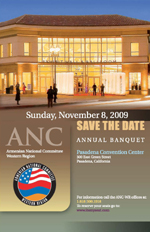 PASADENA, CA - The Armenian National Committee, Western Region (ANC-WR) is pleased to announce plans to hold its annual regional banquet on Sunday, November 8, 2009 at the newly renovated Pasadena Convention Center Ballroom.
PASADENA, CA - The Armenian National Committee, Western Region (ANC-WR) is pleased to announce plans to hold its annual regional banquet on Sunday, November 8, 2009 at the newly renovated Pasadena Convention Center Ballroom.